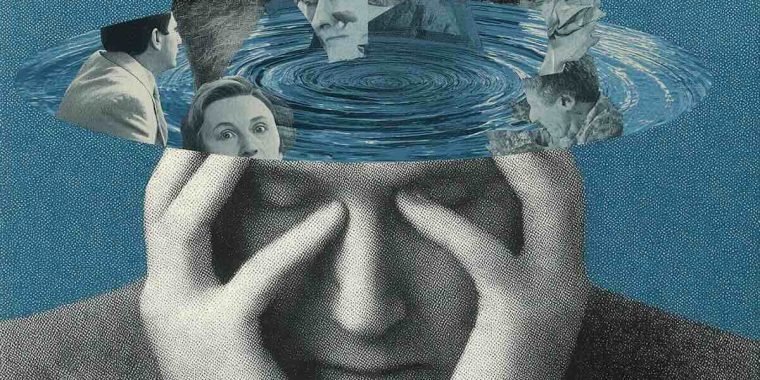Key Points
- Rumination involves repetitive, negative thoughts that feel hard to control.
- Common types include brooding and reflective rumination, with brooding being more harmful.
- It’s often caused by stress, trauma, or brain chemistry and triggered by negative events.
- Rumination is a feature in conditions like depression, anxiety, OCD, and PTSD.
- In OCD, rumination fuels obsessive thoughts, making compulsions harder to resist.
- It can disrupt daily life, causing emotional distress and poor focus.
- Therapy and mindfulness can help stop ruminative thoughts and build healthier habits.
- Professional help is key if rumination affects your relationships or well-being.
- With support, you can break free from rumination and find emotional balance.
What Is Rumination?
Rumination is when your mind keeps circling back to the same negative thoughts, like replaying a mistake or worrying about something that might go wrong. These thoughts feel intense and hard to shake. Unlike problem-solving, rumination doesn’t lead to solutions, it just deepens distress. It’s common in people with mental health challenges but can affect anyone under stress.
Psychologist Dr. Susan Nolen-Hoeksema, who studied rumination, said, “It’s like getting stuck in quicksand, the more you dwell, the deeper you sink.” Most people ruminate at some point, but when it becomes a habit, it can take over daily life. If you’re finding it tough to stop these thought loops, there are ways to move forward1.
Types of Rumination
Rumination can take different forms, each with its own focus and impact. Understanding these types can help you recognize patterns in your thinking.
– Brooding Rumination: This is a passive, negative type where you dwell on your mood or problems without trying to fix them. It’s linked to higher depression risks and feels like endless complaining to yourself.
– Reflective Rumination: More analytical, this type involves thinking about past events to gain insight. It can be helpful in small doses but harmful if it turns into overthinking.
– Intrusive Rumination: These are unwanted thoughts that barge in, often tied to trauma or anxiety. They feel hard to control and can disrupt daily tasks.
– Deliberate Rumination: This intentional type focuses on solving problems, but it can slip into negativity if not managed.
Research shows brooding is the most common and damaging type, often worsening mental health conditions like depression2. Knowing your rumination type can guide how you address it.
Causes of Rumination
Rumination often stems from a blend of psychological, biological, and environmental factors. Personality traits like low self-esteem or perfectionism can make someone more prone to it. Biological causes include imbalances in brain chemicals, such as serotonin, which affect mood regulation. A history of trauma or adverse experiences can also wire the brain toward repetitive thinking as a coping mechanism.
Studies from the American Psychological Association link rumination to conditions like depression and anxiety, where it acts as a maintaining factor3. Dr. Edward Watkins explains, “Rumination feels like a way to gain control, but it often stems from feeling powerless”4. These causes show rumination isn’t a choice, it’s a response that can be changed with support.
Triggers of Rumination
Rumination doesn’t start out of nowhere, it’s often set off by specific triggers. Common ones include stressful events, like an argument or failure at work, that spark negative self-talk. Social interactions, such as feeling judged or rejected, can also trigger thought loops. For some, loneliness or idle time, like lying in bed at night, opens the door to rumination.
Triggers can tie to broader issues, like mood disorders or emotional dysregulation, where small setbacks feel huge. Research highlights that negative events or interpersonal conflicts are top triggers, especially in people with anxiety5. Recognizing your triggers, like fatigue or criticism, is key to stopping rumination before it builds.
Rumination in OCD
In obsessive-compulsive disorder (OCD), rumination is a core feature that fuels obsessive thoughts. People with OCD often get stuck on intrusive thoughts, unwanted ideas or fears, like causing harm or making a mistake. Rumination in OCD means endlessly analyzing these thoughts, trying to figure out what they mean or how to prevent them. This can lead to compulsive behaviors, like checking or seeking reassurance, to ease the anxiety.
For example, someone with OCD might ruminate over whether they locked the door, replaying the moment over and over. This mental loop makes it harder to resist compulsions. Dr. Jonathan Abramowitz explains, “Rumination in OCD is like a mental trap, it amplifies obsessions and drives compulsive actions”6. Recognizing this pattern can help target treatment, especially with therapies designed for OCD.
Mental Health Conditions with Features of Rumination
Rumination is a common symptom in several mental health conditions, making it harder to manage emotions or move forward. Here are some disorders where rumination often plays a role:
– Depression: People with depression and major depressive disorder often ruminate on feelings of sadness, guilt, or worthlessness, which deepens their low mood and prolongs recovery.
– Anxiety Disorders: In conditions like generalized anxiety disorder or social anxiety, rumination involves worrying about future risks or replaying social interactions, increasing anxiety.
– Obsessive-Compulsive Disorder (OCD): As mentioned, rumination in OCD focuses on obsessive thoughts, like fears of harm or contamination, driving compulsive behaviors to reduce distress.
– Post-Traumatic Stress Disorder (PTSD): Individuals with PTSD may ruminate on traumatic events, replaying memories or questioning their actions, which can worsen symptoms like flashbacks.
– Elevated Use in Dysthymia: Individuals with Dysthymia demonstrate elevated use of rumination and other emotion-focused coping strategies.
Dr. Susan Nolen-Hoeksema notes, “Rumination acts like glue, keeping negative thoughts stuck in the mind across many disorders”1. If you notice rumination alongside other symptoms, like low energy or constant worry, a professional can help identify the underlying condition.
How Rumination Affects Life
Rumination can make life feel overwhelming. It drains mental energy, making it hard to focus on work, school, or relationships. People who ruminate might feel sad, anxious, or stuck, as their thoughts keep pulling them back to the same worries. This can lead to depressive symptoms or worsen existing mental health issues.
In social settings, ruminators might seem distant or irritable, as their mind is caught in a loop. At work, they may struggle to concentrate, missing deadlines or feeling overwhelmed. The American Psychological Association says that chronic rumination increases the risk of anxiety and depression, impacting overall well-being7. If you’re feeling trapped by your thoughts, there are ways to find relief.
Ways to Manage Rumination
Breaking free from rumination starts with recognizing it’s happening. Therapy, like Cognitive-Behavioral Therapy (CBT), can help you challenge negative thoughts and replace them with healthier ones. For OCD-related rumination, Exposure and Response Prevention (ERP) is especially effective, teaching you to face obsessive thoughts without acting on compulsions.
Mindfulness is another powerful tool. It helps you notice thoughts without getting caught up in them. Dr. Jon Kabat-Zinn says, “Mindfulness lets you observe your thoughts like clouds passing by, not storms you have to fight”8. Simple habits, like journaling, exercising, or trying relaxation techniques, can also stop the mental loop. Talking to supportive friends or family can make you feel less alone.
When to Get Professional Help
Everyone ruminates sometimes, but if it’s taking over your life, it’s time to reach out. If you can’t stop dwelling on negative thoughts, feel constantly anxious, or notice trouble managing emotions, a mental health professional can help. They can also check for related conditions, like OCD or depression.
At Still Mind Florida, we offer detailed assessments and personalized plans to address rumination and its underlying causes. Our team uses proven strategies to help you regain control and find peace of mind.
Conclusion
Rumination can feel like a mental trap, but it’s a pattern you can break. By understanding its types, causes, triggers, and related conditions, and using tools like therapy and mindfulness, you can stop the cycle of negative thoughts. Whether it’s tied to OCD or other challenges, support is available to help you move forward. Don’t let rumination hold you back, help is just a call away.
If repetitive thoughts are weighing you down, reach out to a professional for guidance.
References
- Nolen-Hoeksema, S. (2003). Women Who Think Too Much: How to Break Free of Overthinking. Henry Holt and Co.
- Watkins, E. R. (2016). Rumination-Focused Cognitive-Behavioral Therapy for Depression. Guilford Press.
- American Psychological Association. Rumination and Mental Health
- Watkins, E. R. (2016). Rumination-Focused Cognitive-Behavioral Therapy for Depression. Guilford Press.
- National Institute of Mental Health. Depression and Related Conditions
- Abramowitz, J. S. (2018). Getting Over OCD: A 10-Step Workbook. Guilford Press.
- American Psychological Association. Rumination and Mental Health
- Kabat-Zinn, J. (2013). Full Catastrophe Living: Using the Wisdom of Your Body and Mind. Bantam Books.






